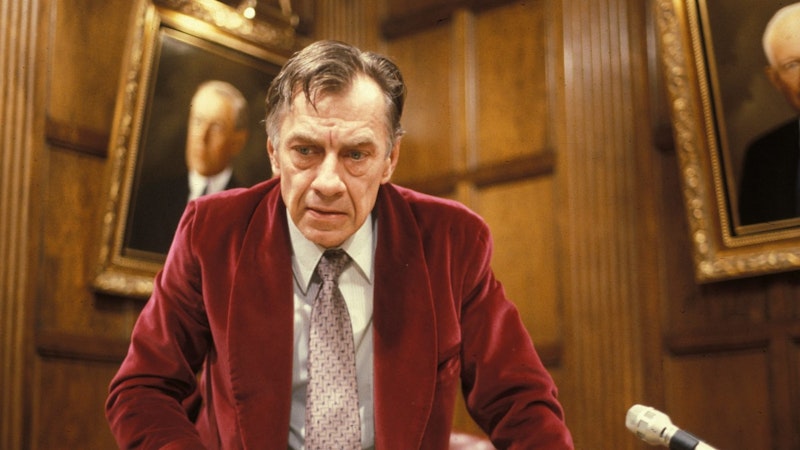In Altman on Altman, Robert Altman told David Thompson that, “I was shooting at the Grand Ole Opry in Nashville when the news of [Nixon’s] resignation came through, and one of the musicians went inside his room and locked the door—he sat and cried and played his violin, he was so upset, and we couldn’t shoot for almost an hour. Most people kept quiet about it because they had been disgraced, and the vast majority of people voted for him. This was democracy at its height.”
He told the same story in the June 1992 commentary track for his 1984 film Secret Honor, a one-man Nixon play adapted for 16mm film starring Philip Baker Hall; he also reiterated his theory that Nixon saw his resignation as a point of pride and the right thing to do for the country, his own “secret honor”: “Nixon’s defense was that he had to become unelectable, to a point where he was almost impeached, to keep himself from being re-elected. The people who controlled him, the Bohemian Grove people, when they saw the power he had achieved, they were going to make him President again. He saw what was happening and felt that was basically wrong, so the way only way to stop it and the only ‘honorable’ thing to do was to get himself caught.”
Donald Trump never got the turnout that Nixon did, but that sense of shame and responsibility for what’s happened is pervasive among liberals and leftists now; listening to Altman’s Secret Honor commentary, along with a 1990 interview with Bob Costas, he makes the point that the American people were still deflated during the 1976 bicentennial because of the humiliation of Nixon resigning. This was a man that, as he said, most of the country voted for (he also notes that, in the play’s initial production as The Last Tape (and Testament) of Richard M. Nixon in New York, “little old ladies” were knitting sweaters for Hall even as he ranted and raved on stage, screaming “FUCK IT!” and grousing about this one, that one, everyone.
Altman lived to see the first and second acts of Trump’s media career—I can’t imagine he was impressed with The Art of the Deal or The Apprentice. He said he had much more sympathy for Nixon than for Ronald Reagan, who was a “bad actor” who “knew he was playing a part.” I imagine Altman would view Trump as the real-life manifestation of his own Buffalo Bill and the Indians, or Sitting Bull’s History Lesson, a 1976 summer release that came and went in a disgraced, unenthusiastic nation. It’s still one of his lesser-known films, despite starring Paul Newman and most of his 1970s regulars. Trump isn’t analogous to Hitler, he’s Buffalo Bill; the connection is clear whether it’s Newman in the role or Michel Piccoli in Marco Ferreri’s even more (unfortunately) obscure Don’t Touch the White Woman! from 1974.
Eleven days before the election—anything can happen. Maybe Kamala Harris will watch Buffalo Bill and the Indians; maybe Tim Walz will. Maybe they’ll like it; then, maybe they’ll bring it up with their communications team; they’ll weigh the pros and cons; they’ll tease it to the media; they’ll say that “news is coming”; and then nothing will happen. Meanwhile, Trump’s smiling serving fries at McDonald’s, grinning ear to ear like Newman, like Buffalo Bill, like a fake, a winner.
—Follow Nicky Otis Smith on Twitter and Instagram: @nickyotissmith

